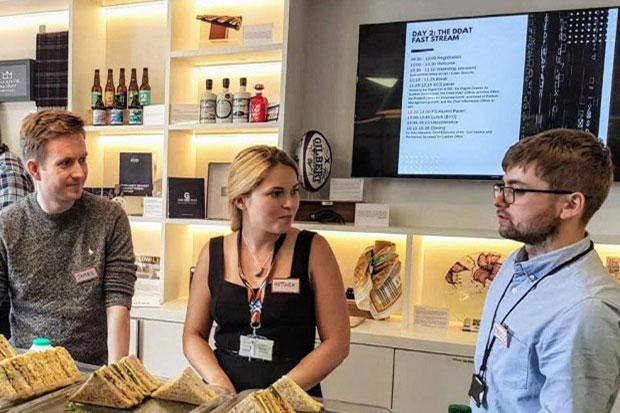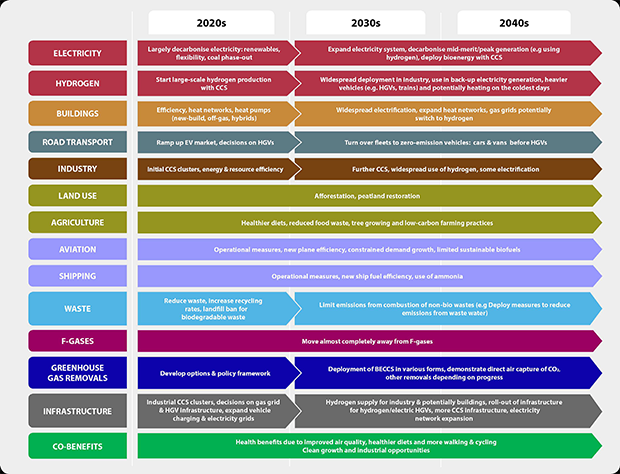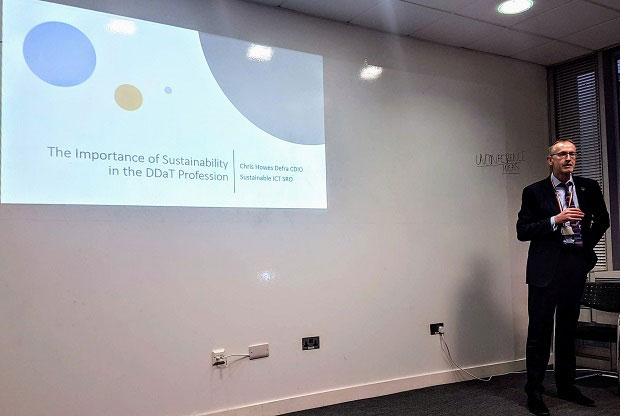
Sustainability has long been a priority for the UK. The issue continues to be high on the political agenda, with Defra’s 25 Year Environment Plan a strong indication of the government’s commitment to achieving better environmental outcomes.
But how many of us have ever considered how IT equipment is recycled, or how IT services might be delivered in a more sustainable way?
As a Civil Service fast streamer in Defra Digital, sustainability is a subject very close to my heart. I recently had the opportunity to attend a conference where ICT sustainability was the main focus, giving me the opportunity to find out more about this fascinating and hugely topical issue.
This year’s Digital, Data and Technology (DDaT) fast stream conference took place earlier this year. The main theme was ‘Sustainability in/through DDaT’ which covered many topics from how we could be more sustainable in our day to day work, to how the use of data and innovative technologies is helping us in the incredible task of achieving net zero carbon emissions by 2050.
Considering Defra’s role as the UK government ICT sustainability lead, and my role as a DDaT professional, I am keen to share my main take-aways from this conference.
Reducing ‘ICT waste’
Defra leads on the sustainable Information and Communications Technology (ICT) strategy for the whole of government. There has been some pretty impressive impact from that, particularly in terms of reducing ‘ICT waste’.
Do you know for example (I didn’t!) that only 0.8% of ICT waste in government went to landfill in 2018/19 as opposed to the 2.09% in 2017/18? And that might not sound like a lot, but consider for a moment, the amount of laptops and mobile phones we use in Defra and multiply that by all the departments in the UK government!
Or that Defra has published a guide for businesses on how to improve their ICT sustainability? Can’t wait to see what further improvements the strategy will make to these figures.
Methane emissions’ contribution to global warming
Methane emissions contribute to the warming of the environment massively. This is a bit of a specific one that I found very interesting.
To put it into perspective, the Global Warming Potential of methane is 28 times that of Carbon Dioxide. And a lot of it comes from biodegradable municipal waste at landfill sites. To be exact 7.4 million tonnes of such waste goes to landfill per year (2017 figures) which will produce 53,000 tonnes of methane per year.
To reduce this, teams from the Defra group have been working for years to reduce biodegradable waste. And new GPS enabled devices to log measures of methane concentration at landfill sites, combined with mapping software for analysis, have massively improved our ability to assess how to best do that. And now this is moving to drones which can cover much larger areas. Exciting times!
The importance of collaboration
As important as digital skills and tools are, digital teams cannot tackle net zero on our own. At this time, talking to our counterparts in other parts of government, the wider public sector, industry and academia matters more than ever.
Some of you may be familiar with the Committee of Climate change’s work. In their UK’s contribution to stopping global warming report from May 2019 they highlighted how many big sectors need to transform and transform together, with Defra also playing an important role.
So it felt very inspiring to hear from a member of BEIS’s Energy Data Taskforce. That team is trying to connect all those involved with the energy system and get them to work together and share data.

The importance of the DDaT profession

There are very few (perhaps even no) net-zero objectives that can be achieved without the help of DDaT. Quite the opposite – the majority require exchanges of data, digitisation and automation, and complex modelling that can support decision-making.
However, the choices we make on how to transform, digitise and automate must always consider sustainability – from what phone we buy and whether drones are the sustainable option, to which cloud service provider we choose and how the environmental impact of a solution would compare to doing nothing.
Find out more
There is so much going on across government to do with sustainability and DDaT. I am personally very excited as a DDaT professional, a civil servant, and a citizen.
If you’re interested in finding out more, Defra’s 25 Year Environment Plan and BEIS’s Clean Growth Strategy are a good place to start.
Recent Comments